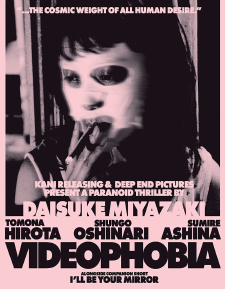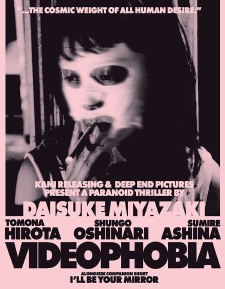Videophobia (Blu-ray Review)

Director
Daisuke MiyazakiRelease Date(s)
2019 (June 28, 2022)Studio(s)
Deep End Pictures (Kani Releasing/Vinegar Syndrome)- Film/Program Grade: B
- Video Grade: A-
- Audio Grade: B+
- Extras Grade: D+
Review
Writer/director Daisuke Miyazaki’s Videophobia is a fever dream examination of the intersection between technology and personal identity. It takes the body horror elements of David Cronenberg and filters them through the distorting visual lens of David Lynch. Miyazaki’s story, which he wrote along with Naoto Akiyama, focuses that lens on Ai (Tomona Hirota), a young Korean-Japanese woman who lives in the Koreatown district of Osaka. She works menial jobs, like wearing mascot costumes. Tasks like that are comfortable for her, because it means that she’s hidden behind a mask. After one evening spent in night clubs, she goes home with a man and has sex with him. Like everything else in her life, she doesn’t take the sex too seriously, but she has a moment with him afterwards where they seem to share a genuine bond, and they end up holding hands together. Later, she finds a video of her encounter has been uploaded to the internet, and with her masks exposed, she starts behaving in an increasingly paranoid and irrational manner.
Nothing in Videophobia is as clear as that description may seem, because everything is viewed through the lens of Ai’s perceptions, and her own grip on reality becomes increasingly tenuous as the film progresses. Even her videotaped encounter can’t be taken at face value, as Miyazaki clearly demonstrates in the way that he presents it. Ai thinks that she finds the camera that was used to record it, but it turns out to be an old Super 8 mm film camera instead. Later, more videos are uploaded, showing the encounter from different angles, as if there was a cameraman in the room with them. Reality and paranoid fantasy blur for Ai, and so they do for the viewer as well. The camera itself becomes increasingly unstable as the film progresses, reflecting her inability to see things clearly anymore.
The fascinating thing about Videophobia is that Ai’s mental breakdown has nothing to do with the fact that her body has been exposed on the internet. Sex for her is transactional and perfunctory, and she treats her body as yet another layer to the masks that she keeps between herself and the outside world. The real issue for her is that people can see the moment of genuine intimacy afterward, where her all of her masks had momentarily dropped. That one brief encounter is enough for her to take the radical step of completely disassociating herself from reality, and using any means possible to create a new mask that can never be removed. Videophobia is definitely a body horror film, but one that works on a more metaphorical level than most such stories. It’s not Ai’s body that’s the issue for her; rather, it’s what lies within it: her very soul. That’s the one thing that she never wanted to reveal to anyone, and therein lies the real horror.
Videophobia was shot by cinematographer Yasutaka Watanabe, but there’s no information available regarding how it was produced. It appears to have been captured digitally, with a layer of fake grain added in post-production. The black-and-white image, framed at 1.85:1, is crisp and clear, with a good grayscale, as well as solid contrast and black levels. While it would have been captured in color, it appears to have been properly graded for black-and-white, rather than simply being desaturated color. The only apparent anomaly is some inexplicable instability in a shot at 62:00. It could have been intentional, as yet another way of reflecting Yu’s break with reality, but it’s the only shot that looks that way, so it also may have been a flaw in the original recording. Regardless, it’s the only noteworthy issue in an otherwise beautiful black-and-white presentation.
Audio is offered in Japanese 2.0 DTS-HD Master Audio, with optional English, Japanese, and Chinese subtitles. (There are actually two different sets of Chinese subtitles, so presumably one is Cantonese and the other is Mandarin, but that’s not clear from either the menu or player selections.) The bulk of the mix is effectively mono, with only a bit of stereo spread for the music—everything else stays anchored to the center. There’s some deep bass in music by BAKU, which is used effectively to create a more foreboding atmosphere. It’s not a dazzling mix, but it’s an appropriate one for the material.
Kani Releasing’s Blu-ray for Videophobia is packaged in a clear amaray case that displays a memorable image from the film on the reverse side of the insert, which is visible when the case is opened. It also includes a 20-page booklet featuring an interview with Miyazaki by Justine Smith that was originally published by Seventh Row. (No notes about the transfer, unfortunately, which is one thing that I wish Kani would include with their releases.) A sticker for I’ll Be Your Mirror has been tucked inside. There’s also a spot gloss slipcover available directly from Vinegar Syndrome, limited to the first 2,000 units. The following extras are included, all of them in HD:
- I'll Be Your Mirror (9:14)
- “Videophobia” Music Video (5:21)
- Trailer (1:05)
- Director's Introduction (1:33)
I’ll Be Your Mirror is a new short film from Miyazaki, commissioned by Kani specifically for this release. It features both Tomona Hirota and Sumire Ashina from Videophobia, and it continues the themes of identity from that film in a strikingly different way—one that’s better experienced than having it explained here. The “Videophobia” Music Video was directed by Miyazaki, blending new footage with clips from the film. The Director’s Introduction features Miyazaki giving a brief overview of the film, and he also describes what the filmmaking process means to him.
Videophobia is another winner from Kani Releasing. The extras are thin, but the fact that they commissioned a new short film is laudable, and everything here is true to their mission statement of expanding the canon of Asian cinema in North America, and also of bolstering up-and-coming Asian filmmakers. Miyazaki is definitely an up-and-comer, so it’s wonderful that Kani has brought this film onto Region-Free Blu-ray for North American audiences.
- Stephen Bjork
(You can follow Stephen on social media at these links: Twitter and Facebook.)

